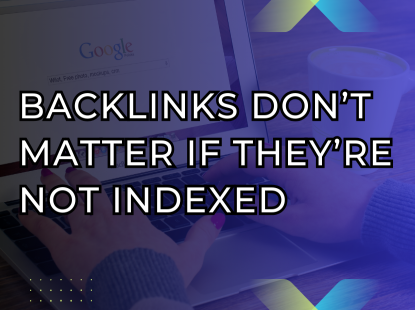How to Index Backlinks and Webpages in Google - A Complete Guide
Why Google Doesn’t Index Your Backlinks?
Google’s crawling and indexing process is more complex than ever. With billions of pages on the web and limited resources, Google has become more selective about how and when it crawls sites. Google doesn’t crawl every page on the internet frequently. It prioritize indexing based on factors like authority, relevance, and freshness. Pages with low authority, outdated content, or technical issues can prevent google from crawling and indexing them. Below are some common reasons why google might not be indexing your backlinks.
Low-Authority Websites
Backlinks from sites with low domain authority or poor trustworthiness are less likely to be crawled or indexed by Google. Such sites are not a priority for Google’s crawlers, and they may not even appear in Google’s index.
Duplicate or Thin Content
If the page containing your backlink has duplicate or very thin content, Google may consider it low-value and skip indexing it. Unique, high-quality content attracts more frequent crawling and indexing.
Noindex Tags or Robots.txt Restrictions
If the page has a noindex tag, it tells Google not to index that page. Similarly, if the page is blocked by robots.txt, crawlers won’t access it.
Spammy or Irrelevant Context
Google is selective about what it indexes to avoid including low-quality or spammy content. If your backlink is on a page with irrelevant or spammy content, it may not be indexed.
New or Recently Created Pages
Fresh pages might not be indexed immediately. Google often takes time to discover and evaluate new content before indexing it.
Slow Page Loading Speeds
Pages that load slowly can deter Google’s crawlers from indexing them. Crawlers might abandon slow pages, leaving your backlinks unnoticed.
Proven Strategies to Index Backlinks in 2025
Build High-Quality Backlinks
Search engines prioritize quality over quantity. Backlinks from reputable and relevant sites with strong domain authority are more likely to be indexed. Avoid links from spammy, low-value directories or PBNs (Private Blog Networks).
Tips for Quality Links:
- Focus on niche-relevant websites.
- Aim for natural placements within the content, such as guest posts or resource pages.
- Collaborate with trusted influencers or industry leaders.
Social Media and Syndication
Promoting the referring page on social platforms can signal relevance to search engines and attract additional crawlers.
Best Practices:
- Share links on high-traffic platforms like Twitter, Facebook, and LinkedIn.
- Use content syndication networks like Medium or Flipboard to expand visibility.
- Encourage comments or discussions on shared links to increase engagement.
Tiered Backlinks
Tiered backlinks for indexing involve creating backlinks to your primary (Tier 1) backlinks in order to increase the chances of those links being discovered and indexed by Google. This is particularly useful for new or hard-to-reach backlinks that Google’s crawlers might otherwise miss.
Each tier serves a specific purpose:
- Tier 1: These are your most important backlinks, pointing directly to your website. These should come from high-authority, relevant websites that Google is likely to crawl and index quickly.
- Tier 2: These backlinks point to your Tier 1 backlinks. The purpose of Tier 2 is to boost the authority and visibility of your Tier 1 links, making it more likely that Google will crawl and index them, and by extension, your website.
- Tier 3: These are the least authoritative backlinks, pointing to your Tier 2 links. These can be from low-authority sites or niche blogs and are used to funnel more link equity to Tier 2 links, further supporting the indexing process.
Use Backlink Indexing Services
Backlink indexing tools and services can help expedite the indexing process. These platforms notify search engines of new backlinks, ensuring faster discovery.
Popular Indexing Tools and Services:
- Link Indexing Expert: Perfect backlink indexing tool for digital marketing agency, SEO Professionals, Webmasters, and Content Creators to get their pages indexed quickly in Google.
- Links Indexing: Can Index Your Webpages, Blogposts and Backlinks Indexed By Google! Within Few Hours.
Conclusion
By understanding why Google may not index your backlinks and following the strategies outlined, you can ensure that your backlinks will get indexed, allowing them to contribute to your site’s SEO performance and improve your search rankings.
